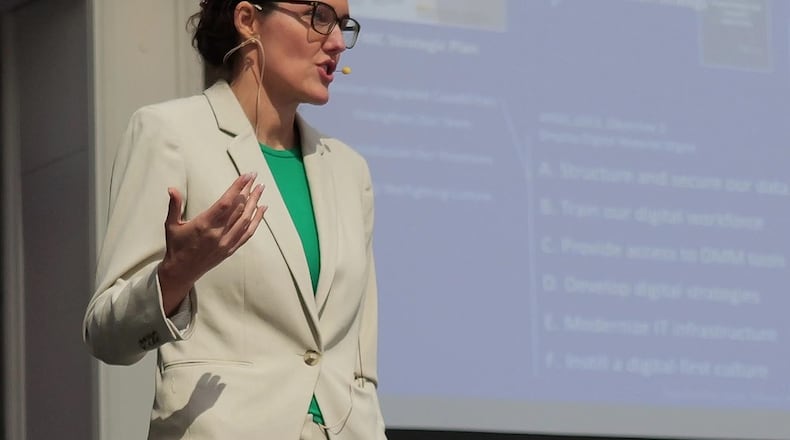“It has really been a fruitful year,” Bonnell told the Dayton Daily News.
Bonnell joined AFRL last July as its first chief information officer and director of its then-new Digital Capabilities Directorate. In that post, she has overseen the laboratory’s information technology strategies.
That’s a lot to oversee. Recently, the Air Force announced the launch of NIPRGPT, a generative Artificial Intelligence (or “AI”) tool to be used on a non-classified internet router network.
The tool provides Air Force airmen and Space Force guardians the chance to exercise AI usage safely, developing what Bonnell called the “muscle memory” that confident use of any tool requires.
AFRL is in the business of research and is no stranger to AI. But the opportunity posed by generative AI — AI that, in the right hands, can create new content, including software code and simulations — could not be ignored.
“I think of it as an augmentation to our ability to learn,” Bonnell said. “But most of all, generative AI is an opportunity to have a relationship with knowledge at speed.”
“If you think about it really, our job at the Air Force Research Laboratory is to kind of ask and answer ‘What if?’ faster than our adversary,” she added.
Bonnell sees her role as AFRL CIO as stopping the things that perhaps no longer work and driving the things that do. When her team recognizes something as game-changing, she pays attention.
“It isn’t so much that I have to invent everything,” she said. “I just have to get behind and catalyze the things that really make sense.”
At Wright-Patterson and Dayton, which Bonnell called “the birthplace of real flight,” tools matter a lot. Beyond generative AI, the Air Force has also explored the use of “digital twins,” computer simulations that model airplanes, weapons and other real-world, physical counterparts.
Digital twins and digital environments can help the military train “battlefield” artificial intelligence, Will Roper, former Air Force assistant secretary for acquisitions, and Eric Schmidt, former Google CEO, recently wrote in the Wall Street Journal.
Bonnell said she has worked on digital twins of everything from supply chain structures to physical structures. “What digital twinning does is, it allows us to be more curious at speed and scale, but proactively.”
Bonnell was one of the first employees of the Internet Trade Association, a non-profit trade association that represents companies doing business on the Internet. She has been noted for emphasizing culture over technology. She pointed to one example of that emphasis on Wright-Patterson: The practice of reserving parking spaces for those in upper-level jobs.
“I didn’t want a parking space to define whether or not I was important, or whether or not my team felt they were important,” she said. “And so, I made the decision for the leadership team at DCD (Digital Capabilities Directorate), we don’t have dedicated parking spaces any more.”
Now, those parking spaces go to those deserving recognition “for doing really great things for our customers.”
Bonnell said she has found a “really positive petri dish” at AFRL. She pronounced herself honored to be a part of the Air Force at this moment in history.
“I think that national security is one of the most important, pressing moments that one can contribute to, especially now as the world is just a rapidly and unexpectedly changing place,” she said.
“As long as we’re able to keep doing and moving the needle, then I’m in,” she said when asked about her continued place in the Air Force. “When and if it becomes too hard, too hard to kind of make a difference, then it will become a really interesting question for me. But I haven’t hit that point yet.”
Though she travels a lot, she is based at Wright-Patterson, with her core team. Bonnell said she is struck by how much her researchers, scientists and specialists love living and working in the Dayton area.
“I’ve never been anywhere where people want to leave less,” she said.
About the Author


